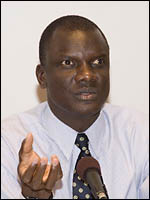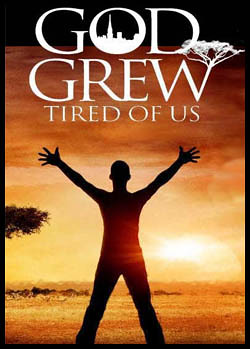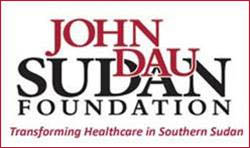Former "Lost Boy" of Sudan, Genocide Survivor, Social Entrepreneur and Humanitarian, John Bul Dau

John Dau is one of the men featured in Christopher Quinn's documentary, God Grew Tired of Us, and he has experienced trials in life that most people never imagine. Born in war-torn Sudan, Dau is one of 27,000 Lost Boys driven from their villages when the Sudanese government began attacking the ethnic minority population of Southern Sudan. Forced to walk to refugee camps in Ethiopia and Kenya, he faced starvation, disease, and violence on treks across hundreds of miles. In 2001, Dau was one of many Lost Boys sponsored to live in the United States.
As a human rights activist for the people of Southern Sudan, he has lived a remarkable life of cultural adaptation. John has received many prestigious awards, including National Geographic's Emerging Explorers award and was a Volvo for Life finalist in the Quality of Life category which carried a contribution from Volvo of $25,000 to the John Dau Sudan Foundation. John was also named a World Economic Forum Young Global Leader for 2008.
As a leader, John is an experienced social entrepreneur. He has started three 501(c)3 organizations. He is an advisor for two of these organizations, the Sudanese Lost Boys Foundation of New York and the American Care for Sudan Foundation, both of which operate with independent boards. His primary effort now is to build the John Dau Sudan Foundation into a financially stable organization that supports the building and maintenance of clinics in Southern Sudan.
John Bul Dau’s life provides the ultimate example of a profile in courage. He has lived a full life – a life full of tragedy, horror, loss, pain, struggle, hope, victory, triumph and joy. But what truly defines John’s life today is his uncompromised commitment to helping other people live a better life. His accomplishments are miraculous. His story is incredible.
DR: Tell me about your life and your work.
JD: My life is squarely about the war and what happened during the war and my adjustment to living in America and the work that I am doing today.
You can see at some point that in Sudan I was in a situation where I thought I would never survive. I was thirteen years old when my village was attacked. It was difficult. I still needed my mother and father, but we were in the jungle where we couldn't even find food. We ate wild fruit and roots and we chewed on grass. The situation abused us into becoming like animals. I mean chewing grass? We were desperate. Disease and wild animals were killing people. We had to eat mud and drink human urine just to stay alive. It reduced us to a situation where we had nothing and we never knew whether we would live to the next minute. But there was one thing that was not shaken -- my faith was not shaken. My faith in Jesus Christ was not shaken. My human nature of resilience was not shaken...
DR: How is that possible?
JD: It never crossed my mind. If you read from the bible, especially the book of Job, you can see that Job was a very wealthy man. A disaster hit and took everything that he had, according to the bible. He lost his property and his children and everything. He was suffering from a disease called shingles and complaining about dying but he resisted forsaking God. His wife asked "Where is God?" and she told Job that "If He could allow us to be like this, there is really no God". Job believed that we can not always expect only good things from God. There will also always be suffering and other things. That helped me. Job ended up recovering everything and became wealthier and happier than before.
I was trying to follow in Job's footsteps. That is one thing that I did. I knew God was with me. I knew that I was God's son. We are all God's babies and He is only disciplining us and shaking us a little bit to see how strong we are.
DR: But you had moments of doubting God and being angry with him, didn't you?
JD: Sometimes. Sometimes I would doubt and sometimes I would remember that God is in control.
Our village was looted, women were raped, men were abducted and it was sometimes, as if God grew tired of us. But God would never grow tired of anybody.
I was up and down but I know that God is in control.
Also, there was my father's advice. He told me that in the world there will be problems and there will be a lot of good. He said that when you are experiencing trouble, know that when that trouble goes, you will be happy. But if you give up, you will miss your happiness because it might be just one minute away.
DR: When did you feel like you could finally exhale because you were out of danger? When did you feel like you were out of trouble?
JD: That comes and goes. For example from my village to Ethiopia, it took us three months. When we got to Ethiopia, I caught my breath. We stayed there for four years but then we were attacked and that reversed everything. We went through trouble for about two years and then when we got to Kenya in 1992, I felt like "Oh, this is very good"! We stayed in Kenya for ten years and then I came to the United States and I thought "Oh this is very good"! And then two weeks later September 11th happened and I said "Oh my God"!
DR: Two weeks!
JD: Two weeks.
DR: Wow...
JD: Yeah...
DR: What is it that you have learned about yourself as a result of what you have endured?
JD: I like to believe that when you go through a tough thing and you engage in thinking about what you can do to get revenge - that is completely useless and a waste of time. I believe in changing the darkest side of your story to something positive. Change it to something better. Think about what you have been through or what you are going through and then think about changing it into something better. This is the way that you can get out of it.
If you keep thinking about how you suffered and how discouraged and unlucky you are, you are wasting your time because you will not stay there forever. You have to quickly change your situation to something positive and the way that you do that is to help someone else. My culture is a culture of helping one another and of giving a hand to someone who needs help. Help other people. Do good things. Help those who can not help themselves. Help others before you die.
What will you say at the end of your life? What will have been your accomplishment?
We are just here for a short time. Think. Think about what you can do so that by the time you leave this world you will have done something that you can be proud of. Instead of bickering and thinking about what happened or planning to kill the Muslims or kill the Christians, why not put a smile on someone's face and treat other people well. What if I decide to help others? What if I work harder so that others can go to school? I am going to work harder so that others can get eye surgery and see again. I am going to work harder to leave something for the community. What would you rather do? Bicker and seek revenge or cause people to smile?
You have to make a choice. I have made my choice.
DR: What has making that choice given back to you?
JD: It has given me joy and it has freed me from my stress. You can never be in a stressful moment when you are pursuing something good because you will forget everything else. I believe that stress and trauma come when we are bored and have nothing good to do.
In America I have seen people do Yoga to relieve stress. Okay. That is good but I think a better way to get rid of stress and trauma, ultimately, is to be engaged in a big goal and you will be free from your own problems.
DR: When you look at the world today, as it is, what would you change?
DONATE TO THE JOHN DAU SUDAN FOUNDATION
Gifts from generous people like you have established the first medical clinic in Duk County. Your donation will provide critical health aid to the Sudanese and allow the Foundation to become a permanent partner in transforming healthcare in Southern Sudan.
Click here to donate online by Paypal
or
Donate by Mail: Checks can be mailed to
John Dau Sudan Foundation
P.O. Box 4
Manlius, NY 13104
*Make checks payable to John Dau Sudan FoundationFor more information on the John Dau Sudan Foundation, click here.
JD: I would promote a feeling of world citizenship.
We are not just from where we live but we are from everywhere. What did we have to do with that war? Why? Why were those people trying to exterminate us? Why is this? The rest of the world was just watching. We were just left there. I don't blame anybody but I think there should be a feeling of helping each other. If families can sit together and solve their problems then the world can sit together and solve its problems.
Let's say that I was killed, maybe there would have been somebody who would have done my work, but maybe not. But the clinic in Southern Sudan now has been built. There has never been a medical clinic or Internet or electricity or doctors coming to do eye surgery or provide treatments but now because of The John Dau Sudan Foundation we have this.
I did it because God helped me survive the war. I did it because I am here!
DR: I would have to say that that is at the top of my list of things I would change about the world too; that we would have more of an awareness and concern for the well being of one another and that we would be able to locate our own self interest and our own sense of well being in helping someone else. For instance, the sense that I am okay only if you are okay...
JD: Exactly...
DR: I just wish there was more of what you are talking about in the world...
What is the wisest thing that anyone has ever said to you?
JD: There have been many but one of the wisest things was said to me by a doctor from the Philippines who had been traveling from one place to another helping people. She said something very simple but I take it to heart
"How can you fear failure when you are doing God's work?"
That means that you can never ever fail when you are doing God's work. What is God's work? Preaching the gospel is not the only thing that is God's work. What you are doing here, Dana, is God's work. You have been writing and opening peoples eyes so that they can see truths and get information that they didn't have before because of your work. That is God's work. God's work is anything that is good that promotes human dignity, that promotes fairness, that promotes justice, that promotes health and the well being of everybody! That is God's work and that has nothing to do with religion.
How can you fear failure when you are doing God's work?
I don't fear anything right now.
DR: That is very wise. What is the wisest thing that you have said to yourself?
JD: The wisest thing that I have said to myself is something that I ask myself:
"What did you do? How will you be remembered"?
I will question myself when I am gone. What will I say that I have done best?
DR: And what will the answer be?
JD: That I tried to help people that needed help.
The work that I am doing right now with The John Dau Sudan Foundation I think it is helping other people. Let me tell you this -- there are people in Duk and Southern Sudan who are coming to the clinic that have never been to a clinic before. I had never seen a doctor in my life until 1993 in Kenya. None of my village members had ever seen a doctor. Not ever, ever, ever! This is the first time people are seeing a doctor. This is the first time people are being treated.
When we came to America we were given the first of January as our birth date because since we were not born in a clinic or hospital we do not know what day we were born. My medical clinic is the first of its kind and I ask God to give me more resources so that I can do more.
DR: That is really wonderful....What do you believe most to be true?
JD: Again, when we become more selfless, things get better. That is the truth that I believe.
DR: Knowing what I know about your life and about your story, I find it almost unbelievable that you could think the way that you think and live the way that you live. I find it a remarkable example to people. Your words have all of the credibility for me because of what you have survived and what you are doing now as a result. That's not really a question but just something I wanted to share.
So, today, what makes you the happiest?
JD: What makes me happiest is that I am doing my duty. The duty is helping others. Also, I have a family. I never knew that I would survive to have a child. To witness a gift, the gift of a child, I mean its makes me so happy and then having a family and having survived and that I am now caring for my own family makes me happiest.
DR: Would you change anything about your life if you could?
JD: I would love to have not gone through what I went through but when I look at it I think there was a reason that I went through it I guess.
There was a reason for all of that atrocity. If not for that war would I have come to the United States? Right now I think things are easy because I compare my life to before. I don't find things difficult that other people would find difficult. Things that seem to be difficult in America I think - "piece of cake".
DR: A hundred years from now, what do you want to be remembered for?
JD: I want to be remembered as someone who transcended the darkness and turned it into something good.
Thanks John!
God Grew Tired of Us

Winner of both the Grand Jury Prize and the Audience Award at the 2006 Sundance Film Festival, GOD GREW TIRED OF US explores the indomitable spirit of three “Lost Boys” from the Sudan who leave their homeland, triumph over seemingly insurmountable adversities and move to America, where they build active and fulfilling new lives but remain deeply committed to helping the friends and family they have left behind.
Orphaned by a tumultuous civil war and traveling barefoot across the sub-Saharan desert, John Bul Dau, Daniel Abol Pach and Panther Blor were among the 25,000 “Lost Boys” (ages 3 to 13) who fled villages, formed surrogate families and sought refuge from famine, disease, wild animals and attacks from rebel soldiers. Named by a journalist after Peter Pan’s posse of orphans who protected and provided for each other, the “Lost Boys” traveled together for five years and against all odds crossed into the UN’s refugee camp in Kakuma, Kenya. A journey’s end for some, it was only the beginning for John, Daniel and Panther, who along with 3800 other young survivors, were selected to re-settle in the United States.

